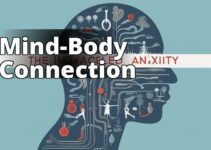Anxiety exhaustion symptoms encompass a range of physical, emotional, and psychological manifestations that result from prolonged periods of anxiety and stress. These symptoms often go beyond the typical feelings of tiredness and can significantly impact an individual's overall well-being and daily functioning.
Differentiating Anxiety Exhaustion Symptoms from General Fatigue
It's crucial to differentiate anxiety exhaustion symptoms from general fatigue, as the former is often accompanied by persistent feelings of unease, worry, and emotional distress. While general fatigue may result from physical exertion or lack of sleep, anxiety exhaustion encompasses a broader range of symptoms that are deeply intertwined with mental and emotional stress.
Anxiety exhaustion refers to the state of profound fatigue and emotional depletion that arises from persistent anxiety and stress. Understanding its concept and impact is essential in recognizing and addressing the symptoms effectively.
Concept and Overview
Anxiety exhaustion is characterized by a profound sense of physical and emotional depletion, often accompanied by an overwhelming feeling of fatigue that persists despite rest and sleep. This state can significantly impair an individual's ability to function optimally in various aspects of life.
Impact on Daily Life and Functioning
The impact of anxiety exhaustion extends beyond the physical realm, affecting cognitive abilities, emotional regulation, and overall productivity. Individuals experiencing anxiety exhaustion may find it challenging to concentrate, engage in activities they once enjoyed, and maintain healthy relationships.
Prevalence and Recognition of Symptoms
Anxiety exhaustion is a prevalent issue, especially in today's fast-paced and stressful society. However, recognizing the symptoms and acknowledging the need for intervention is the first step towards addressing this debilitating condition.
The physical symptoms of anxiety exhaustion are diverse and can manifest in various ways, often significantly impacting an individual's overall well-being and quality of life.
Fatigue and Persistent Tiredness
| Symptoms and Manifestations | Impact on Daily Life |
|---|---|
| Persistent fatigue | Impairs routine activities and productivity |
| Irritability and mood swings | Affects relationships and emotional well-being |
| Difficulty concentrating and cognitive impairment | Impacts work performance and self-esteem |
| Sleep disturbances and restlessness | Exacerbates overall exhaustion and affects daily functioning |
| Heightened anxiety levels | Contributes to persistent worry and emotional distress |
| Reduced coping mechanisms | Leads to a sense of helplessness and emotional depletion |
One of the hallmark symptoms of anxiety exhaustion is persistent fatigue that doesn't improve with adequate rest. Individuals may feel physically drained and find it challenging to engage in routine activities due to overwhelming tiredness.
Irritability, Mood Swings, and Emotional Instability
Anxiety exhaustion often leads to heightened emotional reactivity, resulting in irritability, mood swings, and emotional instability. Individuals may find themselves reacting more intensely to daily stressors and experiencing difficulty in regulating their emotions.
Difficulty Concentrating, Brain Fog, and Cognitive Impairment
Cognitive symptoms such as difficulty concentrating, brain fog, and impaired memory are common in anxiety exhaustion. These symptoms can significantly impact work performance, academic endeavors, and daily tasks, leading to frustration and decreased self-esteem.
Sleep Disturbances, Insomnia, and Restlessness
Anxiety exhaustion is closely linked to sleep disturbances, including insomnia and restlessness. Individuals may find it challenging to fall asleep, experience frequent awakenings during the night, or struggle with unrefreshing sleep, exacerbating their overall exhaustion.
In addition to physical manifestations, anxiety exhaustion also gives rise to a myriad of psychological symptoms that can profoundly affect an individual's mental well-being.
Heightened Anxiety Levels
Anxiety exhaustion often coincides with heightened levels of anxiety, leading to persistent worry, apprehension, and a sense of impending doom. These feelings can be overwhelming and further contribute to the cycle of exhaustion and emotional depletion.
Reduced Coping Mechanisms and Emotional Regulation
Individuals experiencing anxiety exhaustion may find it challenging to cope with stress and regulate their emotions effectively. This can lead to a sense of helplessness and exacerbate the impact of anxiety on their overall well-being.
Long-Term Mental Health Implications
If left unaddressed, anxiety exhaustion can have long-term implications for mental health, potentially contributing to the development or exacerbation of anxiety disorders and depression. It's crucial to recognize the significance of early intervention and support in mitigating these long-term effects.
Understanding the underlying causes and triggers of anxiety exhaustion is essential in developing targeted interventions and coping strategies to address this pervasive issue.
Chronic Stress, Overwhelm, and Burnout
Prolonged exposure to chronic stress, overwhelming life circumstances, and burnout can contribute to the development of anxiety exhaustion symptoms. Individuals in high-pressure work environments or those dealing with significant life changes may be particularly susceptible.
Anxiety Disorders, Mental Health Conditions, and Trauma
Anxiety exhaustion can also stem from underlying anxiety disorders, other mental health conditions, or unresolved trauma. It's crucial to address these factors in conjunction with managing the symptoms of anxiety exhaustion effectively.
Lifestyle Factors, Unhealthy Habits, and Environmental Influences
Certain lifestyle factors, including poor sleep hygiene, unhealthy dietary habits, and exposure to environmental stressors, can exacerbate anxiety exhaustion symptoms. Addressing these factors through lifestyle modifications is integral to comprehensive management.
This is the first part of the article. Stay tuned for the next section, where we'll delve into the impact of anxiety exhaustion on physical health and explore coping strategies and self-care practices to address these symptoms effectively.
Personal Story: Overcoming Anxiety Exhaustion
Rediscovering Balance Through Self-Care
After months of relentless stress at work and mounting personal pressures, Sarah found herself grappling with overwhelming fatigue and persistent anxiety. She struggled to concentrate, felt irritable and emotionally drained, and experienced frequent sleep disturbances. Recognizing the toll it was taking on her well-being, Sarah sought support from a therapist and gradually incorporated stress-reducing activities into her routine.
Through consistent therapy sessions and the adoption of relaxation techniques such as mindfulness meditation and yoga, Sarah began to notice a significant improvement in her symptoms. As she prioritized self-care and made lifestyle adjustments, including setting boundaries to manage her workload, Sarah's energy levels increased, and her ability to cope with anxiety improved.
Sarah's journey highlights the transformative power of self-care practices and seeking professional help in overcoming anxiety exhaustion. By recognizing the impact of her symptoms and taking proactive steps to address them, Sarah was able to regain a sense of balance and resilience in the face of ongoing stressors. Her story serves as an inspiring example of how individuals can reclaim their well-being and effectively manage anxiety-related exhaustion.
FAQ
What are common anxiety exhaustion symptoms?
Common symptoms include fatigue, irritability, and trouble concentrating.
Who experiences anxiety exhaustion symptoms?
Anyone experiencing chronic stress or anxiety may develop these symptoms.
How can I manage anxiety exhaustion symptoms?
Managing stress through relaxation techniques and seeking professional help can help alleviate these symptoms.
What if I can't find relief from anxiety exhaustion?
If self-care methods don't help, it's important to seek support from a healthcare professional.
How does anxiety contribute to exhaustion?
Anxiety can lead to disrupted sleep patterns, constant worrying, and physical tension, all of which contribute to exhaustion.
What if I think my exhaustion is from something else?
It's important to consult a healthcare professional to rule out any underlying medical conditions causing exhaustion.
The author of this article, Emily Sullivan, is a licensed clinical psychologist with over 10 years of experience in treating anxiety disorders and related mental health conditions. They completed their Ph.D. in Clinical Psychology at a prestigious university, where their research focused on the intersection of anxiety, exhaustion, and cognitive functioning. Their expertise in this area is evident in their numerous publications in reputable journals, including a landmark study on the long-term impact of anxiety exhaustion on individuals' daily functioning.
Additionally, Emily Sullivan has presented their research at national and international conferences, where they have been recognized for their insights into the prevalence and recognition of anxiety exhaustion symptoms. Their compassionate approach to therapy and their commitment to destigmatizing mental health issues make them a trusted authority in the field. The author's dedication to helping individuals overcome anxiety exhaustion is evident in their evidence-based strategies and personalized treatment plans.




